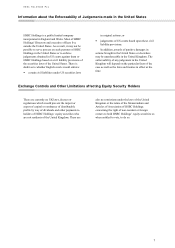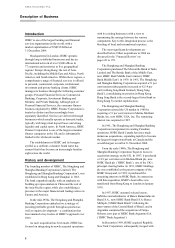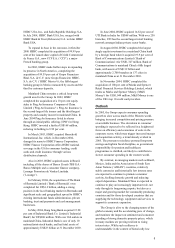HSBC 2004 Annual Report Download - page 19
Download and view the complete annual report
Please find page 19 of the 2004 HSBC annual report below. You can navigate through the pages in the report by either clicking on the pages listed below, or by using the keyword search tool below to find specific information within the annual report.-
 1
1 -
 2
2 -
 3
3 -
 4
4 -
 5
5 -
 6
6 -
 7
7 -
 8
8 -
 9
9 -
 10
10 -
 11
11 -
 12
12 -
 13
13 -
 14
14 -
 15
15 -
 16
16 -
 17
17 -
 18
18 -
 19
19 -
 20
20 -
 21
21 -
 22
22 -
 23
23 -
 24
24 -
 25
25 -
 26
26 -
 27
27 -
 28
28 -
 29
29 -
 30
30 -
 31
31 -
 32
32 -
 33
33 -
 34
34 -
 35
35 -
 36
36 -
 37
37 -
 38
38 -
 39
39 -
 40
40 -
 41
41 -
 42
42 -
 43
43 -
 44
44 -
 45
45 -
 46
46 -
 47
47 -
 48
48 -
 49
49 -
 50
50 -
 51
51 -
 52
52 -
 53
53 -
 54
54 -
 55
55 -
 56
56 -
 57
57 -
 58
58 -
 59
59 -
 60
60 -
 61
61 -
 62
62 -
 63
63 -
 64
64 -
 65
65 -
 66
66 -
 67
67 -
 68
68 -
 69
69 -
 70
70 -
 71
71 -
 72
72 -
 73
73 -
 74
74 -
 75
75 -
 76
76 -
 77
77 -
 78
78 -
 79
79 -
 80
80 -
 81
81 -
 82
82 -
 83
83 -
 84
84 -
 85
85 -
 86
86 -
 87
87 -
 88
88 -
 89
89 -
 90
90 -
 91
91 -
 92
92 -
 93
93 -
 94
94 -
 95
95 -
 96
96 -
 97
97 -
 98
98 -
 99
99 -
 100
100 -
 101
101 -
 102
102 -
 103
103 -
 104
104 -
 105
105 -
 106
106 -
 107
107 -
 108
108 -
 109
109 -
 110
110 -
 111
111 -
 112
112 -
 113
113 -
 114
114 -
 115
115 -
 116
116 -
 117
117 -
 118
118 -
 119
119 -
 120
120 -
 121
121 -
 122
122 -
 123
123 -
 124
124 -
 125
125 -
 126
126 -
 127
127 -
 128
128 -
 129
129 -
 130
130 -
 131
131 -
 132
132 -
 133
133 -
 134
134 -
 135
135 -
 136
136 -
 137
137 -
 138
138 -
 139
139 -
 140
140 -
 141
141 -
 142
142 -
 143
143 -
 144
144 -
 145
145 -
 146
146 -
 147
147 -
 148
148 -
 149
149 -
 150
150 -
 151
151 -
 152
152 -
 153
153 -
 154
154 -
 155
155 -
 156
156 -
 157
157 -
 158
158 -
 159
159 -
 160
160 -
 161
161 -
 162
162 -
 163
163 -
 164
164 -
 165
165 -
 166
166 -
 167
167 -
 168
168 -
 169
169 -
 170
170 -
 171
171 -
 172
172 -
 173
173 -
 174
174 -
 175
175 -
 176
176 -
 177
177 -
 178
178 -
 179
179 -
 180
180 -
 181
181 -
 182
182 -
 183
183 -
 184
184 -
 185
185 -
 186
186 -
 187
187 -
 188
188 -
 189
189 -
 190
190 -
 191
191 -
 192
192 -
 193
193 -
 194
194 -
 195
195 -
 196
196 -
 197
197 -
 198
198 -
 199
199 -
 200
200 -
 201
201 -
 202
202 -
 203
203 -
 204
204 -
 205
205 -
 206
206 -
 207
207 -
 208
208 -
 209
209 -
 210
210 -
 211
211 -
 212
212 -
 213
213 -
 214
214 -
 215
215 -
 216
216 -
 217
217 -
 218
218 -
 219
219 -
 220
220 -
 221
221 -
 222
222 -
 223
223 -
 224
224 -
 225
225 -
 226
226 -
 227
227 -
 228
228 -
 229
229 -
 230
230 -
 231
231 -
 232
232 -
 233
233 -
 234
234 -
 235
235 -
 236
236 -
 237
237 -
 238
238 -
 239
239 -
 240
240 -
 241
241 -
 242
242 -
 243
243 -
 244
244 -
 245
245 -
 246
246 -
 247
247 -
 248
248 -
 249
249 -
 250
250 -
 251
251 -
 252
252 -
 253
253 -
 254
254 -
 255
255 -
 256
256 -
 257
257 -
 258
258 -
 259
259 -
 260
260 -
 261
261 -
 262
262 -
 263
263 -
 264
264 -
 265
265 -
 266
266 -
 267
267 -
 268
268 -
 269
269 -
 270
270 -
 271
271 -
 272
272 -
 273
273 -
 274
274 -
 275
275 -
 276
276 -
 277
277 -
 278
278 -
 279
279 -
 280
280 -
 281
281 -
 282
282 -
 283
283 -
 284
284 -
 285
285 -
 286
286 -
 287
287 -
 288
288 -
 289
289 -
 290
290 -
 291
291 -
 292
292 -
 293
293 -
 294
294 -
 295
295 -
 296
296 -
 297
297 -
 298
298 -
 299
299 -
 300
300 -
 301
301 -
 302
302 -
 303
303 -
 304
304 -
 305
305 -
 306
306 -
 307
307 -
 308
308 -
 309
309 -
 310
310 -
 311
311 -
 312
312 -
 313
313 -
 314
314 -
 315
315 -
 316
316 -
 317
317 -
 318
318 -
 319
319 -
 320
320 -
 321
321 -
 322
322 -
 323
323 -
 324
324 -
 325
325 -
 326
326 -
 327
327 -
 328
328 -
 329
329 -
 330
330 -
 331
331 -
 332
332 -
 333
333 -
 334
334 -
 335
335 -
 336
336 -
 337
337 -
 338
338 -
 339
339 -
 340
340 -
 341
341 -
 342
342 -
 343
343 -
 344
344 -
 345
345 -
 346
346 -
 347
347 -
 348
348 -
 349
349 -
 350
350 -
 351
351 -
 352
352 -
 353
353 -
 354
354 -
 355
355 -
 356
356 -
 357
357 -
 358
358 -
 359
359 -
 360
360 -
 361
361 -
 362
362 -
 363
363 -
 364
364 -
 365
365 -
 366
366 -
 367
367 -
 368
368 -
 369
369 -
 370
370 -
 371
371 -
 372
372 -
 373
373 -
 374
374 -
 375
375 -
 376
376 -
 377
377 -
 378
378
 |
 |
17
Limited market growth: In HSBC’s largest
markets, the UK, the US and Hong Kong, there is
generally limited capacity for market growth in the
provision of basic banking services. However, there
is potential for growth in the provision of a wider
array of financial services to both existing and new
customers, and for expansion into new market and
customer segments, particularly in the field of
consumer finance.
Advances in technology: As the internet and
related technologies has continued to mature, the
delivery of financial services and banking products
through both remote and automated delivery
channels has introduced both new competitive
challenges and opportunities for HSBC. While
specialist providers and non-financial organisations
can deliver a growing range of services across a
wide variety of electronic channels, mainstream
banks are also competing fiercely for the growing
number of customers who now prefer to use this
medium. As these technologies mature, brand
differentiation becomes more difficult and costly.
HSBC continues to offer customers access to its full
range of services in the manner they most prefer.
Internet, interactive TV, mobile phone, WAP and
telephone banking all complement the more
traditional branch network.
Regional factors
Europe
UK
While overall market growth has remained relatively
limited the continuing demand for consumer credit
in the past few years has intensified competition
among the established players and attracted a
number of new entrants, particularly from non
financial services providers. Competition from
mono-line providers of both consumer lending and
savings products has grown in recent years often
through the use of attractive pricing to capture
market share.
Consolidation in the market for credit and
charge cards has increased in recent years as retailers
look to outsource their finance company operations
to established players rather than running them in-
house. This has led to a greater concentration of the
industry in the hands of a relatively small number of
providers and attracted the attention of the Office of
Fair Trading (‘OFT’ ).
In March the OFT referred the supply of store
card services to the Competition Commission
following a study of the £4.8 billion industry. The
study concluded that there were features of the
sector, both in the supply of store card credit to
consumers and in the supply of store card services,
that appeared to prevent, restrict or distort
competition.
The Competition Commission, which published
its initial statement of issues in September, is
expected to provide provisional findings in the first
quarter of 2005 and publish its final report by early
July.
In November, the OFT issued a statement of
objections against the agreement between
Mastercard’s UK members, which includes HSBC
Bank, on the multilateral interchange fees charged
on credit and charge card transactions in the UK.
The statement alleged that parties to the agreement
have infringed competition law and invites
representations from members before the OFT
makes a final decision.
In mid December the Department of Trade and
Industry announced a new Consumer Credit Bill
which seeks to create a clearer and more competitive
market for credit by bringing in new rules to give
consumers better protection and more rights.
France
The French government reformed the pension
system in France in order to reduce the state’s long-
term pension obligations. Retirement ages were
increased and pension entitlements lowered. The
changes are being introduced over a number of years
to allow people to adapt to the new system. To
encourage people to save for their retirement, the
government has introduced both individual and
collective pension plans with tax advantages for
scheme members. With clarification of the rules at
the start of 2005, these plans are now being marketed
by financial institutions in France. HSBC will earn
commissions on the sales of the pension plans and
earn management fees from managing the funds.
The government also created Fonds de Reserve
pour les Retraites, a pension body for state
employees, and sought tenders for management of
€16bn of funds. HSBC Asset Management Europe
SA won two of the tenders to manage €1.2 billion of
assets for a small caps fund and a bonds fund.
Caixa Bank won its case at the European Court
of Justice against the French government on the law
forbidding banks from paying interest on current
accounts. As a result, the law will be withdrawn in
2005, allowing French banks to pay interest on these
accounts. Major banks are examining the
implications of the ruling.
The European Commission is investigating GIE
